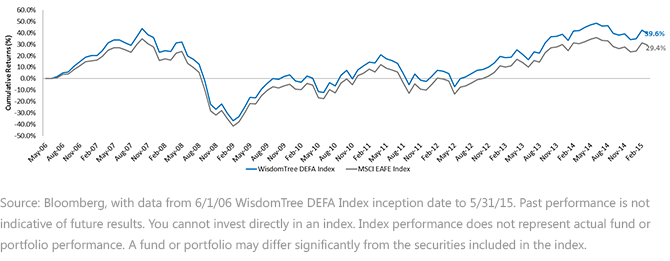What Is Beta for Developed World Dividend Payers?



 For definitions of terms and indexes in the chart, please visit our glossary.
As we see in the chart above, on an annualized basis DEFA has outperformed EAFE by 90 basis points (bps) since its inception in June 2006. This is significant because this was a period when growth stocks in the developed world outperformed value stocks by 162 bps per year.5 In fact, over this period, DEFA not only beat EAFE, it outperformed the growth cut of EAFE—dispelling some myths that fundamentally weighted indexes are merely “value” indexes dressed in the latest garb.
The other interesting takeaway is the relatively low tracking error (about 2%) that the WisdomTree DEFA Index exhibited in relation to the MSCI EAFE Index. When we divide the excess returns by that tracking error, we end up with an information ratio of .43—a measure of risk-adjusted return. This is a ratio some use to determine whether an investment strategy has added any value when one accounts for the “active risk” of not using the standard cap-weighted benchmark for that asset class.
For all these reasons—representativeness of the asset class, high correlation to MSCI EAFE, comparable volatility, higher historic total and risk-adjusted returns as well as a consistently higher dividend yield6—the WisdomTree DEFA Index could easily be considered the “beta” for measuring the dividend-paying part of the developed world. And for those who like the strategy, it is available from WisdomTree in an ETF that is designed to track the WisdomTree DEFA Index before fees and expenses and that has been trading since 2006 as the WisdomTree DEFA Fund (DWM).
1Source: Bloomberg; refers to the MSCI EAFE Index universe versus the S&P 500 Index universe as of 6/19/15.
2Source: Standard & Poor’s, with data as of the most recent Index screening date, 5/31/15.
3Source: Bloomberg, as of 5/31/15.
4Source: Bloomberg, as of 3/31/15.
5Source: Bloomberg, with “growth” referring to the MSCI EAFE Growth Index universe, and “value” referring to the MSCI EAFE Value Index universe.
6Since the inception of the WisdomTree DEFA Index, 108 month-end, trailing 12-month dividend yields have been calculated through 5/31/15, and all of them have been higher than those of the MSCI EAFE Index measured at the same times.
For definitions of terms and indexes in the chart, please visit our glossary.
As we see in the chart above, on an annualized basis DEFA has outperformed EAFE by 90 basis points (bps) since its inception in June 2006. This is significant because this was a period when growth stocks in the developed world outperformed value stocks by 162 bps per year.5 In fact, over this period, DEFA not only beat EAFE, it outperformed the growth cut of EAFE—dispelling some myths that fundamentally weighted indexes are merely “value” indexes dressed in the latest garb.
The other interesting takeaway is the relatively low tracking error (about 2%) that the WisdomTree DEFA Index exhibited in relation to the MSCI EAFE Index. When we divide the excess returns by that tracking error, we end up with an information ratio of .43—a measure of risk-adjusted return. This is a ratio some use to determine whether an investment strategy has added any value when one accounts for the “active risk” of not using the standard cap-weighted benchmark for that asset class.
For all these reasons—representativeness of the asset class, high correlation to MSCI EAFE, comparable volatility, higher historic total and risk-adjusted returns as well as a consistently higher dividend yield6—the WisdomTree DEFA Index could easily be considered the “beta” for measuring the dividend-paying part of the developed world. And for those who like the strategy, it is available from WisdomTree in an ETF that is designed to track the WisdomTree DEFA Index before fees and expenses and that has been trading since 2006 as the WisdomTree DEFA Fund (DWM).
1Source: Bloomberg; refers to the MSCI EAFE Index universe versus the S&P 500 Index universe as of 6/19/15.
2Source: Standard & Poor’s, with data as of the most recent Index screening date, 5/31/15.
3Source: Bloomberg, as of 5/31/15.
4Source: Bloomberg, as of 3/31/15.
5Source: Bloomberg, with “growth” referring to the MSCI EAFE Growth Index universe, and “value” referring to the MSCI EAFE Value Index universe.
6Since the inception of the WisdomTree DEFA Index, 108 month-end, trailing 12-month dividend yields have been calculated through 5/31/15, and all of them have been higher than those of the MSCI EAFE Index measured at the same times. Important Risks Related to this Article
Foreign investing involves special risks, such as risk of loss from currency fluctuation or political or economic uncertainty. Funds focusing their investments on certain sectors increase their vulnerability to any single economic or regulatory development. This may result in greater share price volatility. Please read the Fund’s prospectus for specific details regarding the Fund’s risk profile.


